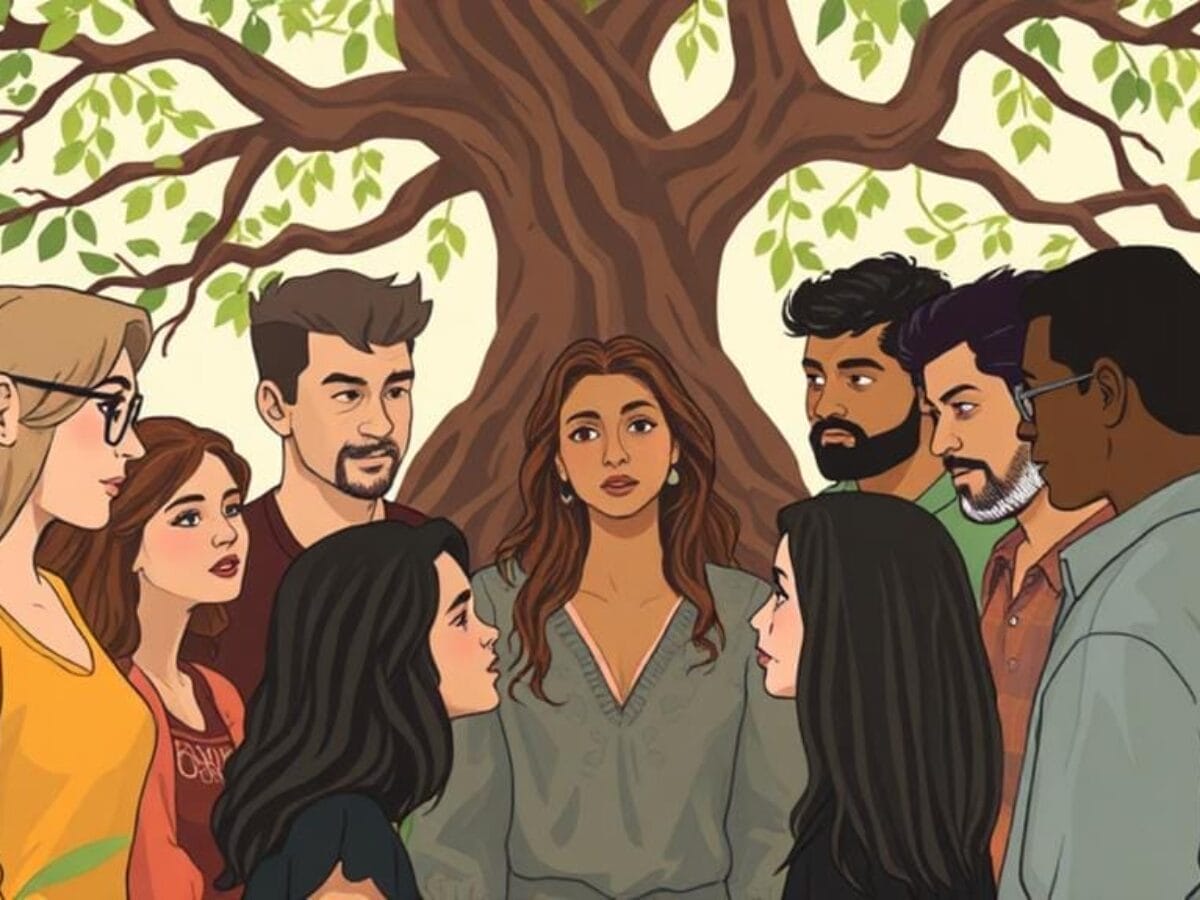Interpersonal relationships play a vital role in shaping your personality by influencing your emotions, values, and behaviors. Family teaches you attachment styles and essential skills like empathy. During adolescence, friendships help define your identity through social bonding, while romantic relationships enhance intimacy and trust. Peer pressure can prompt changes, sometimes boosting self-esteem or creating doubt. Your communication style—whether assertive or passive—also affects personal expression. Cultural values further color these dynamics, informing your beliefs and how you handle conflict. All these interactions contribute to your self-concept, setting the stage for continuous growth and discovery in your personal journey.
Key Takeaway
- Family dynamics and attachment styles significantly shape emotional responses and future relationship behaviors, impacting overall personality development.
- Peer influence during adolescence plays a crucial role in shaping identity, preferences, and social behaviors through modeling and emotional contagion.
- Robust emotional support systems enhance self-worth and resilience, promoting healthy coping strategies and personal growth during challenging times.
- Effective conflict resolution skills foster stronger relationships by encouraging empathy, negotiation, and open communication, essential for personal development.
- Cultural influences shape values, behavior, and community interactions, impacting self-perception and interpersonal relationships throughout life stages.
The Role of Family Influences

Family influences play a vital role in shaping interpersonal relationships and personality development. Your family acts like the training ground for your emotional toolkit. Parental expectations set the stage for how you perceive success and failure, impacting your self-esteem and drive. When your parents support your dreams, you feel empowered, fostering a sense of security. However, if their expectations feel overwhelming, it might lead to stress or self-doubt.
Sibling dynamics offer another layer to your emotional growth. Growing up with siblings often teaches you negotiation, sharing, and empathy—the building blocks of healthy relationships. Whether you’re competing for attention or forming lifelong bonds, these interactions shape how you connect with others. Learning to navigate conflicts with siblings also lays the groundwork for handling future disagreements.
Attachment styles developed in childhood are essential, too. If you experience love and nurturing, you’re likely to adopt a secure attachment style, which helps you form healthy relationships as you age. On the other hand, inconsistent care might lead to anxiety or avoidance in relationships, leaving you feeling insecure.
Lastly, family rituals create a sense of belonging and stability, all while instilling values and traditions. Whether it’s movie nights or holiday gatherings, these moments build cherished memories. They reinforce connections among family members and help you feel valued.
Friendships and Socialization

Friendships shape your personality in ways you might not even realize. The influence of your peers can steer your choices, provide essential emotional support, and teach you critical conflict resolution skills. Let’s explore how these relationships not only enrich your life but also play a key role in your overall development.
Impact of Peer Influence
During adolescence, the impact of peer influence on personality development becomes particularly pronounced. Your friendships shape who you are and guide your choices. With peer dynamics in play, social bonding strengthens your connections and builds a sense of group identity. As you share experiences with friends, you start aligning your values, which can steer your lifestyle choices.
You might find yourself adopting new interests or behaviors through emotional contagion. Around friends, your reactions and decisions get reinforced, often without you even realizing it. It’s fascinating how the group can affect your decision-making processes, subtly influencing your direction.
Behavioral modeling also comes into the picture. When you observe your peers’ actions, you may replicate them, consciously or unconsciously. This exchange of influence can either uplift or challenge your personal aspirations, so being mindful about your circle is essential.
In this way, the friendships you cultivate during these years not only reflect your current self but also shape your emerging identity. So cherish those connections—after all, they’re a key part of your adventure in becoming who you’re meant to be!
Emotional Support Systems
As you navigate through adolescence, the emotional support systems you build become increasingly crucial. The friendships you foster and the social connections you create serve as essential support networks. These relationships cultivate emotional availability, allowing you to share your thoughts and feelings without fear. When you have relational trust with your friends, you’re more likely to engage in healthy validation processes, reinforcing each other’s worth.
You may find that these connections offer effective coping strategies for stress management. Your friends can provide empathetic responses during tough times, making you feel understood and less isolated. This emotional safety is instrumental in developing healthier attachment styles, laying the groundwork for future relationships.
Through shared experiences and challenges, your support network helps nurture your emotional well-being. By relying on each other for guidance and encouragement, you’ll learn the value of being there for someone else too. These interactions not only shape who you are but also equip you with important life skills. So as you build your emotional support systems, remember that these connections are more than just friendships; they’re the lifelines that enrich your journey of personal growth.
Conflict Resolution Skills
While maneuvering through the complexities of social interactions, developing conflict resolution skills becomes essential for maintaining healthy friendships. These skills help you navigate relationship dynamics and guarantee everyone feels heard and valued. Utilizing effective listening promotes empathy development, which turns conflicts into opportunities for deeper connections.
Incorporating negotiation tactics and assertive communication can empower you to express your needs clearly, while also showing respect for others’ viewpoints. You’ll want to recognize different conflict styles, as understanding these will enhance your situational awareness.
Romantic Relationships’ Impact

Romantic relationships play an essential role in shaping your personality and emotional well-being. These connections greatly influence your intimacy development, attachment styles, and even your social skills. You might find that your personality traits evolve as you navigate the joys and challenges of love. For instance, empathy growth often springs from understanding your partner’s feelings, which strengthens the relationship over time.
Here’s a glimpse into how romantic relationships can impact various aspects of your development:
| Aspect | Positive Impact | Negative Impact |
|---|---|---|
| Intimacy Development | Increases vulnerability and trust | Can lead to emotional dependency |
| Trust Issues | Promotes open communication | Creates communication barriers |
| Conflict Dynamics | Teaches effective conflict resolution | May cause dependency concerns |
| Passion Evolution | Enhances relationship satisfaction | Risk of emotional burnout |
Navigating trust issues or communication barriers may challenge your emotional landscape. However, successful romantic relationships often foster resilience and personal growth. Your ability to handle conflict dynamics can improve, letting you tackle challenges with grace.
Peer Pressure and Identity

Peer pressure plays a huge role in shaping your identity as you navigate through various stages of life. It can push you to either conform to group norms or assert your individuality, creating a delicate balance in your self-development. Understanding the effects of peer pressure not only helps you recognize how it influences your choices, but also strengthens your resilience against just going along with the crowd.
Defining Peer Pressure Effects
Experiencing peer pressure can greatly influence identity formation during key developmental stages. When you’re surrounded by others, social dynamics play an essential role in shaping who you become. You might feel a strong pull to fit in, leading to identity shifts that come from trying to meet group norms. Let’s look at some common effects of peer pressure:
- Conformity Influence: You might find yourself adopting behaviors that don’t truly resonate with you.
- Individuality Pressure: This can push you to struggle between being yourself and fitting in.
- Self-Esteem: When you give in to pressure, it can either boost self-esteem temporarily or lead to long-lasting feelings of doubt.
- Behavioral Examples: Think about how deciding what to wear or which activities to join becomes harder when trying to please your peers.
Using effective coping strategies can help you navigate these challenges. By refining your decision-making skills, you can maintain your individuality while still enjoying the company of others. Remember, it’s perfectly okay to stand out and embrace who you are—after all, your unique identity is worth celebrating!
Identity Formation Mechanisms
While various factors contribute to identity formation, peer pressure often serves as a significant mechanism that can shape who you are during critical developmental periods. You might find that your self perception shifts dramatically when you engage with different social circles. The need to belong is powerful, and aligning yourself with your peers can influence your attitudes, choices, and even values.
Think about it: when you’re surrounded by friends who share similar interests, your social identity becomes clearer. You start to see yourself through their eyes, adopting behaviors and opinions that may differ from your own. This isn’t necessarily negative; it can help you explore new aspects of yourself. However, it’s crucial to navigate peer influences mindfully.
Sometimes, you might feel the pressure to conform to fit in, but remember, it’s equally important to honor your authentic self. Balancing the desire to belong with your individual preferences leads to healthier identity formation. By being intentional about your social circles, you can build a supportive environment that encourages positive self perception shifts while maintaining your unique identity. Embrace the journey; it’s a critical part of growing up!
Resilience Against Conformity
Steering through the landscape of social interactions can equip you with the tools to resist conformity and maintain your true identity. It’s essential to cultivate conformity resistance so you can express your individuality freely, even when peer pressure looms large. By honing these skills, you’ll develop the resilience needed to stay true to yourself.
Here are some effective strategies for embracing your uniqueness:
- Know Your Values: Understand what matters to you. This clarity gives you a strong foundation against external pressures.
- Surround Yourself with Supportive People: Seek friends who celebrate your individuality; they’ll bolster your confidence when challenges arise.
- Practice Assertiveness: Learn to say “no” comfortably. This small act can greatly shield your identity from being overshadowed.
- Celebrate Your Quirks: Embrace what makes you different. Those unique traits can be your greatest strengths.
Ultimately, resisting conformity isn’t about rejecting others; it’s about standing firm in your personal identity. By expressing yourself authentically, you’re paving the way for a fulfilling life, where your individuality shines brightly, unaffected by the pressures around you.
Communication Styles and Personality

Effective communication serves as the cornerstone of interpersonal relationships and profoundly influences personality development. Your communication style shapes how you express yourself and interact with others, affecting your relationships and your sense of self. Understanding different styles can enhance your interpersonal dynamics, helping you grow personally.
Here’s a quick overview of communication styles:
| Style | Description | Impact on Personality |
|---|---|---|
| Assertive | Expresses thoughts clearly and respectfully | Builds confidence and self-esteem |
| Passive | Avoids expressing feelings; may appear submissive | Can lead to feelings of resentment |
| Nonverbal Cues | Includes body language, facial expressions | Enhances empathy and connection |
| Feedback Mechanisms | Encouraging and receiving constructive feedback | Fosters resilience and growth |
When you practice assertive communication, you develop strong listening skills and empathy development. In contrast, passive communication can create communication barriers that restrict personal expression. Additionally, nonverbal cues play a crucial role; your body language can communicate just as powerfully as your words.
In today’s digital communication age, being mindful of tone and clarity is key. Misinterpretations can arise easily through texts or emails, affecting interpersonal dynamics. Remember, effective communication isn’t just about speaking; it’s also about listening and offering thoughtful feedback.
Cultural Background and Values

Cultural background and values shape how you interpret the world and connect with others. Your cultural identity provides a unique lens through which you view experiences and relationships. Embedded within value systems and belief frameworks, these elements influence your personality development more than you might realize.
Think about how your context impacts you:
- Tradition Practices: They define daily habits, rituals, and milestones, offering you a sense of belonging.
- Social Norms: These unwritten rules shape how you behave and interact, keeping you aligned with community expectations.
- Community Influence: Your neighborhood and its collective mindset can either empower or challenge your self-expression.
- Familial Expectations: Family often instills deep-rooted beliefs about success, relationships, and morality that guide your choices.
Cultural narratives weave the stories you tell about yourself, creating a rich tapestry of experiences that mold your identity. These narratives can either inspire confidence or create inner conflicts, depending on how they align with your personal aspirations.
Conflict Resolution and Growth

Understanding your cultural background lays the groundwork for addressing conflicts that arise in relationships. When you enter a conflict with awareness of your roots, you can respond more thoughtfully instead of reacting impulsively. This self-awareness enables you to navigate disagreements using emotional intelligence, a key factor in fostering meaningful connections.
As you encounter conflict, adaptive coping strategies become your best friends. These techniques allow you to approach challenges with flexibility. Instead of seeing conflict as a threat, consider it an opportunity for growth. You might ask yourself, “What can I learn from this situation?” By shifting your perspective, you foster a safer environment for you and your relationship.
Effective communication is essential in resolving conflicts. Speak openly and honestly about your feelings, and actively listen to the other person’s perspective. This doesn’t mean you have to agree on everything; it means you’re willing to understand each other. Utilize your emotional intelligence to read the room and adjust your responses accordingly. Recognize your triggers, and address them calmly to prevent escalation.
Long-Term Effects on Self-Concept

Throughout your life, the ups and downs of interpersonal relationships greatly shape your self-concept. These connections can either lift you up or leave you feeling unsure about yourself, which greatly impacts your self-esteem development. As you navigate friendships, family ties, and romantic partnerships, the feedback you receive from others influences how you see yourself.
The long-term effects can manifest in various ways, including:
- Increased self-awareness: Understanding your strengths and weaknesses through interactions.
- Resilience building: Overcoming challenges in relationships makes you more adaptable.
- Empathy enhancement: Learning to relate to others’ feelings fosters emotional intelligence.
- Social comparison: You often evaluate yourself against others, which can either motivate or discourage you.
When you find a supportive network, it boosts your confidence and encourages positive self-reflection. Conversely, negative experiences—like criticism or betrayal—might lead to self-doubt and insecurity.
As you grow, cultivating healthy relationships can be a game-changer for your self-concept. Imagine surrounding yourself with people who believe in you, celebrate your achievements, and challenge you in uplifting ways. Additionally, remember that social comparison doesn’t have to be a negative force; it can serve as motivation to aim for your personal best. Ultimately, the relationships you nurture will play a pivotal role in shaping who you become. Take the time to invest in these connections, and watch how your self-concept flourishes!
Frequently Asked Questions
How Do Childhood Experiences Shape Adult Personality Traits?
Your childhood experiences shape your adult personality traits through parenting styles, sibling dynamics, and role models, creating a social environment that fosters early attachment and emotional security, influenced further by peer interactions and cultural context.
Can Personality Change After Traumatic Relationship Experiences?
Can you really transform after a traumatic relationship? Absolutely. Through healing processes, trust rebuilding, and strong coping mechanisms, you can cultivate emotional resilience, navigate identity shifts, and alter destructive relationship patterns, embracing a safer, new self.
Do Internet Relationships Affect Personality Development?
Internet relationships can greatly affect your personality development. Online friendships foster empathy through digital communication, while gaming interactions and virtual communities enhance social skills. Anonymity effects might encourage openness, offering online support that shapes your self-identity.
How Do Gender Roles Influence Interpersonal Relationships and Personality?
Gender roles can warp relationship dynamics to a ridiculous degree. You’re maneuvering through intricate social conditioning, often shaped by cultural influences. Your communication styles reflect these gender expectations, which also filter through role modeling, affecting your interpersonal connections.
What Role Does Emotional Intelligence Play in Personality Formation?
Emotional intelligence shapes your personality by enhancing emotional regulation, boosting empathy skills, and improving social awareness. These aspects strengthen relationship dynamics, allowing you to connect better with others and fostering a sense of safety and understanding.
Conclusion
Interpersonal relationships shape your personality much like a sculptor molds clay. Each connection—be it family, friends, or romantic partners—carves out distinct traits, influences your self-concept, and inspires growth. As you navigate conflicts and embrace diverse communication styles, you’re not just developing a personality; you’re creating a masterpiece that reflects your experiences and values. Remember, the people you surround yourself with can either chisel away at your essence or help you flourish into your true self!







